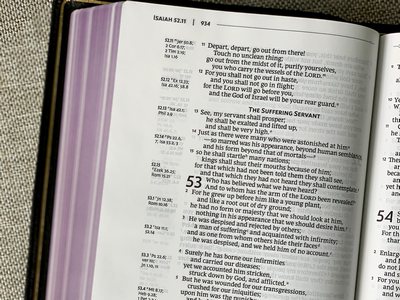A Man Of Sorrows – Part Two

Isaiah continued his description of the Messiah when he wrote, “He was oppressed, and he was afflicted, yet he opened not his mouth: he is brought as a lamb to the slaughter, and as a sheep before her shearers is dumb, so he openeth not his mouth” (Isa. 53:7). This was a foretelling of how Jesus would remain silent when He was accused of the Jews. Matthew recorded, “And when he was accused of the chief priests and elders, he answered nothing” (Matt. 27:12). Matthew further mentioned, “And he answered him to never a word; insomuch that the governor marvelled greatly” (Matt. 27:14). Also, the reference to the Messiah’s oppression and affliction is fulfilled in the terrible mistreatment that Jesus endured. Take for instance the hateful disdain that many Jews had for the Christ. When Jesus could have been released, “…the chief priests and elders persuaded the multitude that they should ask Barabbas, and destroy Jesus…They all say unto him, Let him be crucified. And the governor said, Why, what evil hath he done? But they cried out the more, saying, Let him be crucified” (Matt. 27:20-23). Further, the Lord endured the terrible treatment of scourging, mockery, being spat upon, and ultimately crucifixion (Matt. 27:28-35).
Isaiah then mentioned that the Messiah “…was cut off out of the land of the living: for the transgression of my people was he stricken” (Isa. 53:8). This is a direct prophecy of the Messiah’s death. “Jesus, when he had cried again with a loud voice, yielded up the ghost” (Matt. 27:50). John put it this way: “When Jesus therefore had received the vinegar, he said, It is finished: and he bowed his head, and gave up the ghost” (John 19:30). Jesus was “stricken” because of the refusal of mankind to obey God. In other words, Jesus was “stricken” because of sin. “For all have sinned, and come short of the glory of God; Being justified freely by his grace through the redemption that is in Christ Jesus: Whom God hath set forth to be a propitiation through faith in his blood, to declare his righteousness for the remission of sins that are past, through the forbearance of God” (Rom. 3:23-25). The writer of Hebrews stated that Jesus “…should taste death for every man” (Heb. 2:9).
Then, Isaiah indicated that the Messiah would make “…his grave with the wicked, and with the rich in his death; because he had done no violence, neither was any deceit in his mouth” (Isa. 53:9). Matthew wrote, “Then were there two thieves crucified with him, one on the right hand, and another on the left” (Matt. 27:38). Further, Matthew mentioned, “When the even was come, there came a rich man of Arimathaea, named Joseph, who also himself was Jesus’ disciple: He went to Pilate, and begged the body of Jesus. Then Pilate commanded the body to be delivered. And when Joseph had taken the body, he wrapped it in a clean linen cloth, And laid it in his own new tomb, which he had hewn out in the rock: and he rolled a great stone to the door of the sepulchre, and departed” (Matt. 27:57-60). Pilate had already mentioned that Jesus was innocent when he stated, “…I am innocent of the blood of this just person: see ye to it” (Matt. 27:24).
The prophet Isaiah further wrote, “Yet it pleased the LORD to bruise him; he hath put him to grief: when thou shalt make his soul an offering for sin, he shall see his seed, he shall prolong his days, and the pleasure of the LORD shall prosper in his hand. He shall see of the travail of his soul, and shall be satisfied: by his knowledge shall my righteous servant justify many; for he shall bear their iniquities. Therefore will I divide him a portion with the great, and he shall divide the spoil with the strong; because he hath poured out his soul unto death: and he was numbered with the transgressors; and he bare the sin of many, and made intercession for the transgressors” (Isa. 53:10-12). It was previously mentioned about Jesus being crucified between two thieves (Matt. 27:38). Also, it was the sacrifice of Jesus that “satisfied” the debt that man owed God. Paul stated, “For when we were yet without strength, in due time Christ died for the ungodly…Much more then, being now justified by his blood, we shall be saved from wrath through him. For if, when we were enemies, we were reconciled to God by the death of his Son, much more, being reconciled, we shall be saved by his life” (Rom. 5:6-10; cf. Rom. 6:23).
When one does a diligent study of Isaiah chapter fifty-three, he can readily see the references to the “man of sorrows”, who is the Messiah. By utilizing the New Testament, the student can make proper applications to deduce that the Messiah is Jesus, the Christ. How grateful we should be to our Lord!
~ Corey Barnette
